9.11对美国经济的影响 英文报告(另有PPT)
- 格式:doc
- 大小:30.50 KB
- 文档页数:2
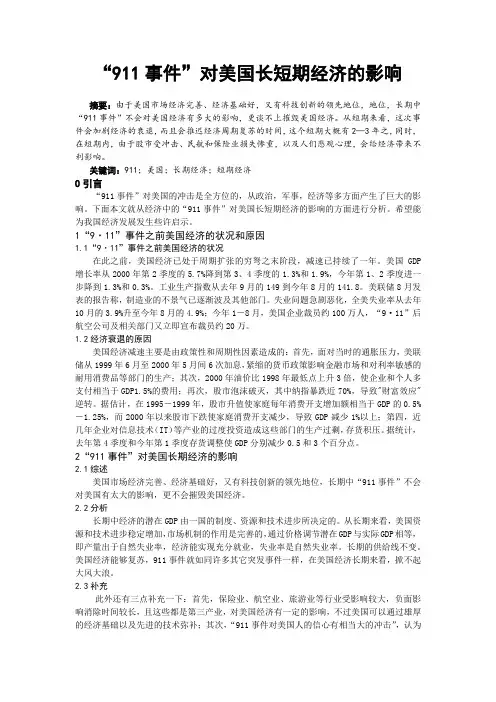
“911事件”对美国长短期经济的影响摘要:由于美国市场经济完善、经济基础好,又有科技创新的领先地位,地位,长期中“911事件”不会对美国经济有多大的影响,更谈不上摧毁美国经济。
从短期来看,这次事件会加剧经济的衰退,而且会推迟经济周期复苏的时间,这个短期大概有2—3年之,同时,在短期内,由于股市受冲击、民航和保险业损失惨重,以及人们悲观心理,会给经济带来不利影响。
关键词:911;美国;长期经济;短期经济0引言“911事件”对美国的冲击是全方位的,从政治,军事,经济等多方面产生了巨大的影响。
下面本文就从经济中的“911事件”对美国长短期经济的影响的方面进行分析。
希望能为我国经济发展发生些许启示。
1“9·11”事件之前美国经济的状况和原因1.1“9·11”事件之前美国经济的状况在此之前,美国经济已处于周期扩张的穷弩之末阶段,减速已持续了一年。
美国GDP 增长率从2000年第2季度的5.7%降到第3、4季度的1.3%和1.9%,今年第1、2季度进一步降到1.3%和0.3%。
工业生产指数从去年9月的149到今年8月的141.8。
美联储8月发表的报告称,制造业的不景气已逐渐波及其他部门。
失业问题急剧恶化,全美失业率从去年10月的3.9%升至今年8月的4.9%;今年1-8月,美国企业裁员约100万人,“9·11”后航空公司及相关部门又立即宣布裁员约20万。
1.2经济衰退的原因美国经济减速主要是由政策性和周期性因素造成的:首先,面对当时的通胀压力,美联储从1999年6月至2000年5月间6次加息,紧缩的货币政策影响金融市场和对利率敏感的耐用消费品等部门的生产;其次,2000年油价比1998年最低点上升3倍,使企业和个人多支付相当于GDP1.5%的费用;再次,股市泡沫破灭,其中纳指暴跌近70%,导致"财富效应"逆转。
据估计,在1995-1999年,股市升值使家庭每年消费开支增加额相当于GDP的0.5%-1.25%,而2000年以来股市下跌使家庭消费开支减少,导致GDP减少1%以上;第四,近几年企业对信息技术(IT)等产业的过度投资造成这些部门的生产过剩,存货积压。
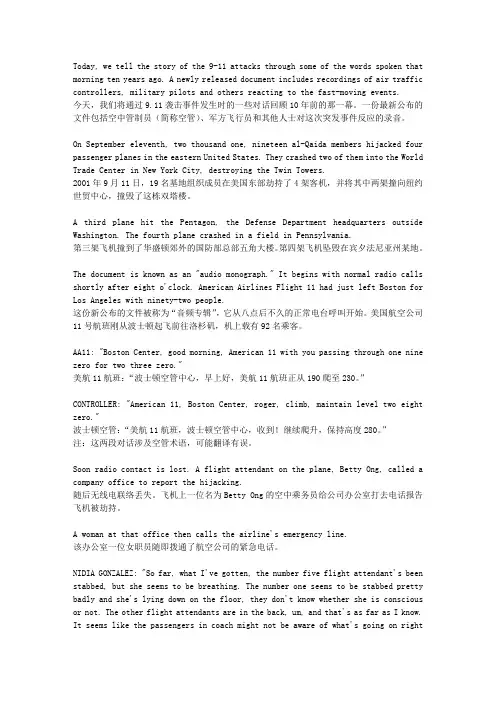
Today, we tell the story of the 9-11 attacks through some of the words spoken that morning ten years ago. A newly released document includes recordings of air traffic controllers, military pilots and others reacting to the fast-moving events.今天,我们将通过9.11袭击事件发生时的一些对话回顾10年前的那一幕。
一份最新公布的文件包括空中管制员(简称空管)、军方飞行员和其他人士对这次突发事件反应的录音。
On September eleventh, two thousand one, nineteen al-Qaida members hijacked four passenger planes in the eastern United States. They crashed two of them into the World Trade Center in New York City, destroying the Twin Towers.2001年9月11日,19名基地组织成员在美国东部劫持了4架客机,并将其中两架撞向纽约世贸中心,撞毁了这栋双塔楼。
A third plane hit the Pentagon, the Defense Department headquarters outside Washington. The fourth plane crashed in a field in Pennsylvania.第三架飞机撞到了华盛顿郊外的国防部总部五角大楼。
第四架飞机坠毁在宾夕法尼亚州某地。
The document is known as an "audio monograph." It begins with normal radio calls shortly after eight o'clock. American Airlines Flight 11 had just left Boston for Los Angeles with ninety-two people.这份新公布的文件被称为“音频专辑”,它从八点后不久的正常电台呼叫开始。
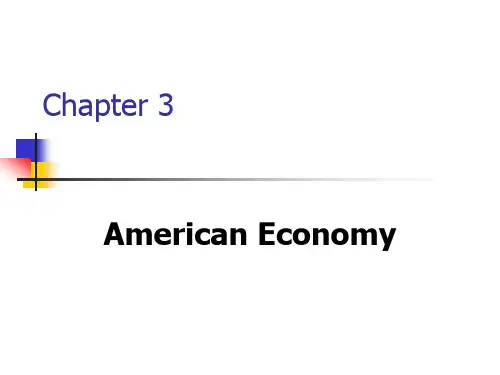
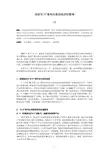
浅析“9.11”事件对美国经济的影响雷震摘要:在美国经济进行阶段性调整的关键时期,“9.11” 恐怖袭击事件的发生为美未来经济发展带来巨大不确定性。
本文从行业生产、外来投资、国民消费趋势等领域深入分析其负面的短期影响,且系统研究了恐怖袭击及反恐行动可能给美国经济带来的中长期影响;并着重分析“9.11”事件发生后美国经济迅速复苏的主要原因,以及未来美伊战争对美经济发展潜在的影响。
关键字:“9.11”事件;经济增长;财政赤字;美伊战争2001年9月11日,恐怖分子劫持美国民航客机袭击了纽约世界贸易大厦和华盛顿五角大楼等地,造成了重大的人员和财产损失,引起世界震惊。
恐怖袭击发生后,国际社会普遍认为,恐怖行动将打击投资者和消费者的信心,扼杀美国缓慢的经济复苏,因此纷纷下调对美经济预测,称2001年美经济增长将下调0.5%,2002年也将下调1.2%,并认为到2003年底,由恐怖袭击事件造成的全部损失预计将达5000亿美元,约占美国民生产总值的5%。
时至今日,“9.11”事件发生已过一年,美反恐也已持续近一载,如何客观评估恐怖袭击给美国经济带来的影响,成为各界专家学者讨论的热门话题。
本文将对此作一浅析。
1.美国经济在“9.11”事件发生前的表现上个世纪90年代,由于新技术革命引发的知识经济的推动,美国经济经历了一个相对较长的增长期,经济运行保持低通胀和高增长。
由于市场对高利润的追逐,投资者对高科技产业投资不断加大,引发以计算机产业为代表的生产过剩。
从2000年下半年开始,美经济增长明显放缓,代表高科技企业的纳斯达克股票指数不断下跌。
美经济进入了周期性调整阶段,并于2001年3月开始陷入衰退,2001年第一季度美国内生产总值下跌约0.6%,第二季度下跌幅度则超过了1.7%。
为了制止经济衰退,布什政府大力推行庞大的减税计划,以期刺激消费,支持经济增长。
在此政策作用下,美投资和消费信心指数一度有所回升,衰退程度也好于预期,比较轻微,但此时“9.11”事件发生了。
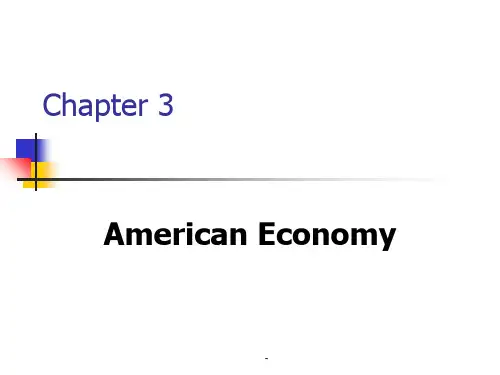
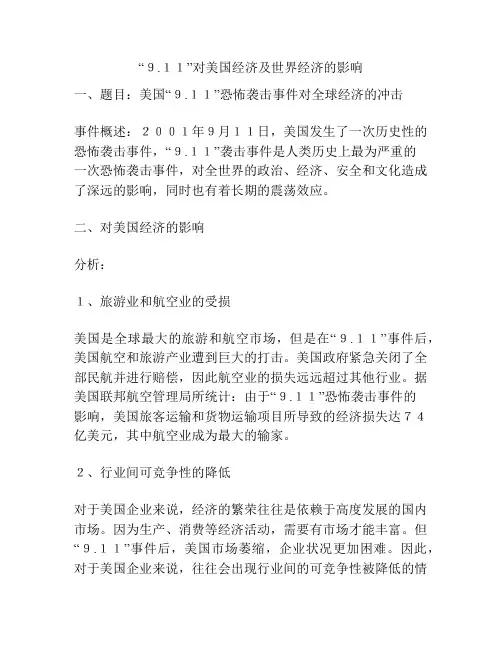
“9.11”对美国经济及世界经济的影响一、题目:美国“9.11”恐怖袭击事件对全球经济的冲击事件概述:2001年9月11日,美国发生了一次历史性的恐怖袭击事件,“9.11”袭击事件是人类历史上最为严重的一次恐怖袭击事件,对全世界的政治、经济、安全和文化造成了深远的影响,同时也有着长期的震荡效应。
二、对美国经济的影响分析:1、旅游业和航空业的受损美国是全球最大的旅游和航空市场,但是在“9.11”事件后,美国航空和旅游产业遭到巨大的打击。
美国政府紧急关闭了全部民航并进行赔偿,因此航空业的损失远远超过其他行业。
据美国联邦航空管理局所统计:由于“9.11”恐怖袭击事件的影响,美国旅客运输和货物运输项目所导致的经济损失达74亿美元,其中航空业成为最大的输家。
2、行业间可竞争性的降低对于美国企业来说,经济的繁荣往往是依赖于高度发展的国内市场。
因为生产、消费等经济活动,需要有市场才能丰富。
但“9.11”事件后,美国市场萎缩,企业状况更加困难。
因此,对于美国企业来说,往往会出现行业间的可竞争性被降低的情况。
三、对世界经济的影响分析:1、全球信心低落“9.11”事件造成全球股票市场的大幅下滑,股市跌幅不断扩大,全球经济陷入一场长达数年的低迷时期。
作为全球领导经济体的美国,在这场经济恐慌中首当其冲。
2、与恐怖主义国家关系的重新考虑“9.11”事件是为数不多的由恐怖武装组织发动全球性袭击事件,许多联盟国家都参与了美国的反恐行动,而恐怖主义的根源问题仍然没有得到解决。
全球有些国家开始重新审视自己与恐怖主义国家的关系,对恐怖主义的态度有了更为明确、更为果断的立场。
四、案例分析1、2001年9月11日,美国航空公司在“9.11”事件中失去了两架飞机和许多乘客,航空公司的经济损失超过了30亿美元。
2、欧洲的宏观经济状况受到三重冲击,分别是“9.11”恐怖袭击事件、全球股市下滑和美元汇率的下降,影响了整个欧洲经济的稳定。
3、2002年5月13日,伊拉克和叙利亚签订“外交协议”,试图从政治上反对“美国的掌控”。
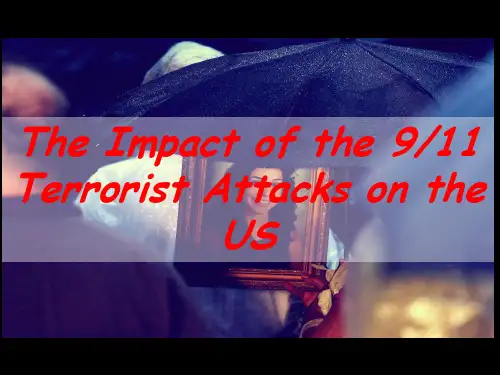
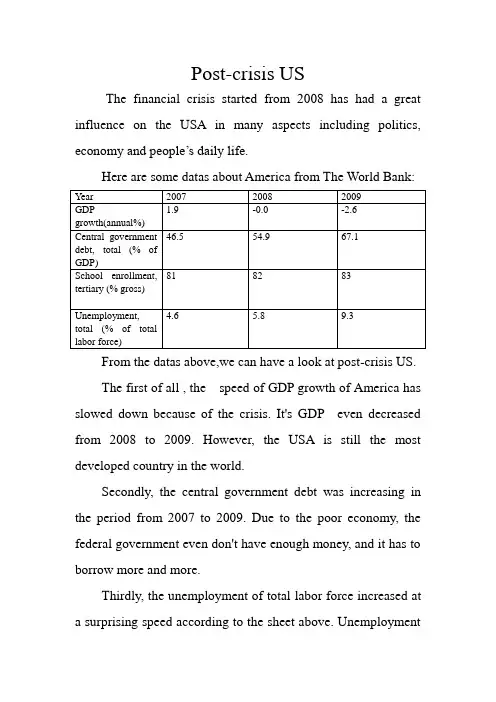
Post-crisis USThe financial crisis started from 2008 has had a great influence on the USA in many aspects including politics, economy and people’s daily life.Here are some datas about America from The World Bank: Year 2007 2008 20091.9 -0.0 -2.6GDPgrowth(annual%)Central government46.5 54.9 67.1debt, total (% ofGDP)81 82 83School enrollment,tertiary (% gross)Unemployment,4.65.8 9.3total (% of totallabor force)From the datas above,we can have a look at post-crisis US.The first of all , the speed of GDP growth of America has slowed down because of the crisis. It's GDP even decreased from 2008 to 2009. However, the USA is still the most developed country in the world.Secondly, the central government debt was increasing in the period from 2007 to 2009. Due to the poor economy, the federal government even don't have enough money, and it has to borrow more and more.Thirdly, the unemployment of total labor force increased at a surprising speed according to the sheet above. Unemploymentmay cause more crimes and social unrest. And the people tended to complain about the government.Many people even lose hope on the future.The last, the rate of school enrollment in tertiary had increased in the period from 2007 to 2009. Why? I think may be the reason is the unemployment. Because jobs are more difficult to look for,students prefer to stay at school rather than go to society where they can't find a job.And that's some general analysis about post-crisis US.基础医学院临床医学(七年制)王运超 20105620829。

The geopolitical effects of 9.11Professor Ms. Niloufer Bhagwat, J.Sun May 1, 2005 00:49The 11th September 2001 terrorist attacks and the war, raise issues as to the use of 9.11 attacks and the war; within the United States; even as Corporations, collapsed, due to financial accounting frauds and systemic problems, which resulted in millions of job losses,attributed to 9.11 by the media,Two witnesses appeared before the T ribunal, to depose about conditions in the United States, immediately after the 11th September 2001. Mr. Bobby Marsh who lost a loved one in the World T rade Centre, gave the T ribunal a poignant account of the personal tragedies of so many people in the United States, including his own. The attacks were seen by him and other people in the United States, first on T elevision. The visual images had a devastating impact on him and other people; those who had loved ones in these buildings were agonized about their safety. The witness deposed that he was informed on the cell phone by Margaret, his close friend and companion who worked at the World T rade Centre; that instructions had been given by some officials to all those trapped in the towers, when the attack took place, to stay where they were, till the fire brigade department gave further instructions; his companion who obeyed the instructions died. This was the last communication that he was to receive from her. Many people who rushed to safety, ignoring official instructions, survived. This witness further deposed that the terrorist attacks of 11th September 2001 were used to create paranoia among the people; there was an attempt to create a war hysteria. The media in particular was immediately mobilizing people for war; on the other hand the anti-war movement was supported by thousands of Americans across the United States who did not support a war on Afghanistan; even some of those who were affected by the 9.11 terrorist attacks and had lost their loved ones.Ms. Gloria Lavera, President of the press workers union, the Union of T ypographical Workers gave detailed evidence on the use of the print and television media to create mass hysteria; and on the deteriorating situation within the United States for the freedom and democratic rights of citizens; with workers losing jobs, facing repression, and reductions in their social security benefits; the witness mentioned that immigrants were detained in hundreds without trial and no access to legal counsel. Simultaneously surveillance commenced, on different groups and individuals, by intelligence organizations within the United States including illegally accessing their internet., telephones, and even libraries to verify their political beliefs. In this atmosphere, the Patriot Act was passed, sacrificing political freedom in the name of National Security; authorizing detentions and extensive surveillance of law abiding citizens. In answer to a question from the T ribunal, as to in whose interest the Patriot Act was passed; this witness replied that it was passed in the interest of the Corporations in the context of mounting job losses.11. War CrimesThe Defendant as Commander-in-Chief of U.S. forces, was aware that the military attack on Afghanistan was unjustified; yet orders were given for the carpet bombing of cities, towns, and villages. The nature of weapons of mass destruction used, the range of firepower unleashed in a country with few military targets; resulted in mass murder of civilians and unnecessary loss of life of combatants who were surrendering. The entire infrastructure ofAfghanistan was destroyed;The women of Afghanistan who have lived through the horror of these war crimes, have given evidence before this T ribunal; their oral evidence has been reinforced and supported by authoritative reports of humanitarian and scientific organizations. It is clear from these reports from neutral sources, that the bombings of United States military forces were indiscriminate, sparing neither the International Red Cross Hospitals in Kabul and Kandahar, the Kajakai dam; warehouses of the Red Cross where food was stored; the maternity hospital at Kabul; the military hospital at Herat; homes, electrification facilities, irrigation projects, schools, TV stations and telephone exchanges were among other institutions indiscriminately bombed and destroyed; constructed over years of development efforts by the people of Afghanistan, a landlocked developing country.The testimony of Kenji Katsui, a journalist from Japan, who with a team investigated the destruction caused by the war and bombing; reveals that in several parts of Kabul, in towns and villages across of Afghanistan, civilian homes and the infrastructure of the country was in ruins, due to bombing; sources of water supply and electricity were affected, normal life in such circumstances for the people was impossible. The witness conceded that a civil war, had raged in Afghanistan for more than 20 years, causing immense suffering; however he emphasized, that the war waged by the United States was the final blow. The witness handed over the video film taken by him which was screened by the T ribunal, of the destruction caused and interviews with people in Afghanistan. The witness maintained that his testimony was supported by the entire investigative team; present as observers at the trial.There have been other agonizing accounts before this T ribunal, of indiscriminate bombing of civilian homes and areas; from witnesses for whom it was not easy to depose, as they were women from Afghanistan, the victims of the bombing, directly affected. Witnesses A, B and C (whose identities have been concealed on request by referring to them in an alphabeticalorder)Witness A had lost members of her family in the bombings of Kabul in a civilian home;Witness B fled from Afghanistan, when the bombings commenced from U.S. aircraft;trekked several miles seeking shelter in refugee camps on the borders of Afghanistan/Pakistan, which she said lacked in 2001 the basic facilities, such as food and other amenities, which had been available during the earlier civil war in Afghanistan, when she had sought shelter from successive regimes and their atrocities; deposing that she and her family had become a refugee four times since 1979. Witness C had lost her daughter, adedicated young teacher in her early twenties, immediately after her marriage; the couple had been bombed in their home, by United States forces while they were asleep; her only desire was that a school be constructed, to commemorate her daughter's commitment toeducation.On answers to questions from the T ribunal the witnesses denied that their homes were military targets, or in close proximity to any military installations; Witness A stated that a few T aliban were residing in residential homes in the area, but there were no militaryinstallations.The witnesses agonized by their loss, maintained, that the reason for their presence at the trial, was the necessity to find a voice for the suffering inflicted on them, without reason; and the disruption of their lives earlier by the civil war between the Mujahideen forces and the government of Afghanistan, when Russian troops arrived; thereafter by the warlords; after that by the T aliban forces; and finally by the U.S. military invasion, bombings andoccupation; they had lost hope for the future.Even as the T ribunal prepared for its concluding hearings in December 2003; a UN spokesmen on 5th/6th December expressed regret that 15 children were killed in U.S. bombing, on a village. Whereas U.S. forces claimed that this was collateral damage as theywere pursuing the T aliban.12. Plea on behalf of the Defendant of "collateral damage” on civilians that use of weapons of mass destruction not prohibited by a specific Convention; legally untenable in view of clear rules of International Humanitarian Law for the conduct of warfare.CLICK FULL REPORT:/cc/gwbush/icta.judgment.htmI believe that "T ruth “is a weapon on the side of humanity. If truth is known, tyranny and injustice will be defeated. The T ribunal has performed its Judicial task. It is now for peopleto ensure the implementation of this verdict.Professor Ms. Niloufer Bhagwat, J.T okyo, 13th March 2004/mason/stories/WO0403/S00215.htm\\\\\\\\\\\We are an action-oriented 9-11 website. Many good websites already exist offering research and analysis of the events of September 11th, 2001. Our purpose is not to duplicate these efforts, nor to prove or disprove what really happened. Rather, our goal is to support the 9-11 truth movement itself, led by the victims' families' efforts to obtain full government accountability for the suspicious and unprecedented intelligence and air defense failures that took place before and during the attacks. What you will find on this site are information andtools designed to help build this movement.。
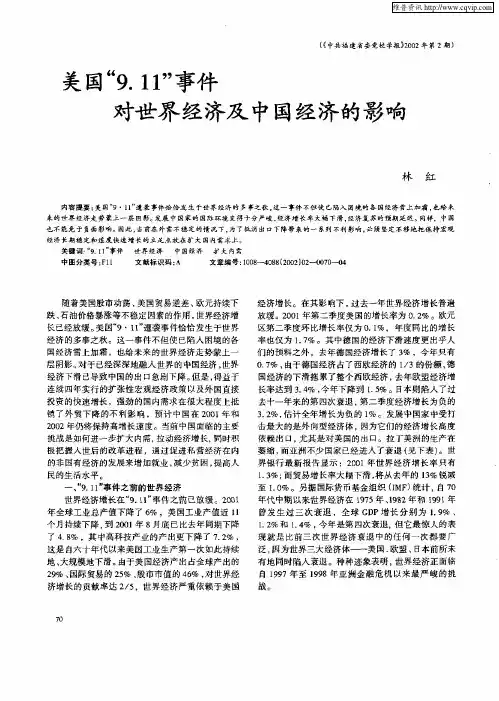
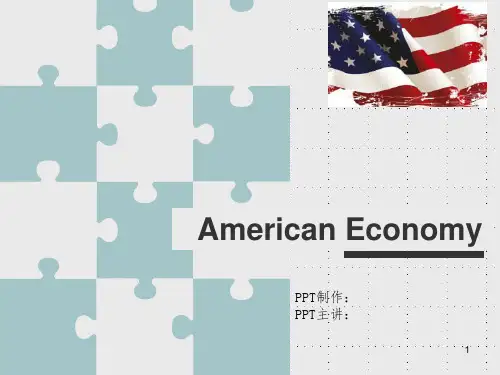
“911事件”对美国长短期经济的影响“911事件”对美国长短期经济的影响摘要:由于美国市场经济完善、经济基础好,又有科技创新的领先地位,地位,长期中“911事件”不会对美国经济有多大的影响,更谈不上摧毁美国经济。
从短期来看,这次事件会加剧经济的衰退,而且会推迟经济周期复苏的时间,这个短期大概有2—3年之,同时,在短期内,由于股市受冲击、民航和保险业损失惨重,以及人们悲观心理,会给经济带来不利影响。
关键词:911;美国;长期经济;短期经济0引言“911事件”对美国的冲击是全方位的,从政治,军事,经济等多方面产生了巨大的影响。
下面本文就从经济中的“911事件”对美国长短期经济的影响的方面进行分析。
希望能为我国经济发展发生些许启示。
1“9·11”事件之前美国经济的状况和原因1.1“9·11”事件之前美国经济的状况在此之前,美国经济已处于周期扩张的穷弩之末阶段,减速已持续了一年。
美国GDP 增长率从2000年第2季度的5.7%降到第3、4季度的1.3%和1.9%,今年第1、2季度进一步降到1.3%和0.3%。
工业生产指数从去年9月的149到今年8月的141.8。
美联储8月发表的报告称,制造业的不景气已逐渐波及其他部门。
失业问题急剧恶化,全美失业率从去年10月的3.9%升至今年8月的4.9%;今年1-8月,美国企业裁员约100万人,“9·11”后航空公司及相关部门又立即宣布裁员约20万。
1.2经济衰退的原因美国经济减速主要是由政策性和周期性因素造成的:首先,面对当时的通胀压力,美联储从1999年6月至2000年5月间6次加息,紧缩的货币政策影响金融市场和对利率敏感的耐用消费品等部门的生产;其次,2000年油价比1998年最低点上升3倍,使企业和个人多支付相当于GDP1.5%的费用;再次,股市泡沫破灭,其中纳指暴跌近70%,导致"财富效应"逆转。
据估计,在1995-1999年,股市升值使家庭每年消费开支增加额相当于GDP的0.5%-1.25%,而2000年以来股市下跌使家庭消费开支减少,导致GDP减少1%以上;第四,近几年企业对信息技术(IT)等产业的过度投资造成这些部门的生产过剩,存货积压。
The U.S. recessionEconomic downturn (Recession): (by U.S. standards) when the economy in total output, income and employment for 6 months to a year of significant decline in general economic contraction in many sectors there is this economic decline as recession. Sustained more severe economic downturn into a depression. Keynes believed that the reduction in aggregate demand for goods is the main reason for the recession.The reasons for U.S. economic recessionSecond half of 2000, the U.S. economy since the end of March 1991 has been 10 years of rapid growth, entered a period of slow growth. Economic growth in 2001 declined quarter by quarter, the sudden "9.11" is a serious blow to consumer and investor confidence, the U.S. economy accelerated rate of decline. Third quarter of 2001, the U.S. economy has negative growth of 1.3%. U.S. government to save the economy has taken a series of policy measures, including: $ 4 million for emergency anti-terrorism and economic reconstruction plan, to aviation, the insurance industry to provide $ 15 billion in assistance; lowered the federal funds rate four times (2001 The Fed cut interest rates 11 times); proposed $ 100 billion economic stimulus package and other programs to save the U.S. economy. After many interventions, revive the U.S. economy: 2001 fourth-quarter GDP stabilized slight, the economic growth rate reached 1.4%, the economic indicators seem to indicate that the U.S. economy is bottoming out signs. However, the U.S. economy is indeed recovering, how much strength of the recovery is still controversial. The main reason the U.S. economic recessionOverall, the U.S. recession is the result of cyclical adjustment of economic development, the U.S. economy after 10 years of rapid growth for a structural repair. Since 1991, out of the recession, the U.S. economy began rapid expansion and continued for 10 years. However, the economic cycle, the internal laws of the objective requirements of the U.S. economy must be an appropriate adjustment, so high-tech industries in the industrial restructuring of the U.S. economy into a cyclical fluctuations when it appears a very necessary.1. "New economy" will not * eliminate cyclical fluctuations, but also needs its own structural adjustment"New economy" although there are high growth, low inflation, globalization and speed-oriented development and other new features, but because of its traditional economic and born out of long-term coexistence with the traditional economy, so in this development process, the traditional law of the economic cycle is still will play a role. Meanwhile, information technology and network development, and the overall economy more closely linked to economic adjustment from one department to another department of the transfer speed, leading to changes in speed and overall economic growth than in the past is more sensitive to economic changes . "New economy" on the amplification of fluctuations in the economy is the U.S. economy into recession this * one of the main.With the spread of information industry investment boom, the United States in the late 1990s, the international capital markets to absorb a large number of foreign investment, resulting in large-scale expansion of the U.S. stock market. In the United States in 1999 foreign direct investment and portfolio investment (excluding U.S. Treasury bonds) is $ 607 billion in 2000 to $ 782.4 billion. Because information asymmetry, resulting inscrambling of the group effect of over-expansion of investment demand, there has been a lot of duplication. Once the fluctuations in the economy, technology investments resulting in excess supply immediately apparent, the direct consequence of a large number of Internet companies closed down. According to the U.S. Internet company merger investigation, the end of 2000 there are about 210 listed companies to stop operating the network, the network companies listed about 60% of the total.(2) stock market bubble burst, the negative wealth effect into effect, so that over-consumption suddenly dropped to the bottomAccording to the U.S. Revenue Service estimates that 1995-1999 period the U.S. stock market in a bull market, the actual average annual growth rate of capital gains 34% of the residents increased by 1.7 trillion U.S. dollars in revenue. Stock market wealth effect stimulates consumption than ever before, more than a year to promote economic growth of about 1 percentage point. However, after 1999, the stock market crash of the financial assets has shrunk dramatically, resulting to a negative wealth effect. At the same time, by the economic downturn, a large number of companies have laid off employees or reduce salaries, consumer income levels were significantly decreased.3 oil prices on the U.S. economic slowdown played a role in fuelingNow the proportion of U.S. oil imports up 54%, international oil prices from the end of 1998 less than $ 10 per barrel rose to $ 14.9 per barrel (September 2000), which enables the operating costs of enterprises and consumers in the energy expenditure a significant increase in severely inhibit economic growth. According to the American Manufacturers Association estimated that in 1999 and 2000 oil prices between the U.S. economy lost more than 1150 billion dollars, the equivalent of U.S. GDP by one percentage point, higher oil prices on U.S. economic recession had a negative impact.4 U.S. economy, there are still three unresolved issuesHuge foreign trade deficit, the dollar value, and negative growth in personal savings is the current troubled U.S. economy, the three main issues. U.S. economic growth mainly rely on domestic demand, in general, a huge foreign trade deficit little negative impact on the economy. But when the sharp drop in domestic demand, the economic downturn, the huge deficit will accelerate the economic recession. Strong U.S. dollar will affect exports, further expand the trade deficit; personal savings will result in negative growth in the money market decline, stock market, especially in the capital market fell, the currency market can not play its due role, to a certain extent, will affect economic development.5. "9.11" exacerbated the extent of U.S. economic recession, the U.S. economy and the potential impact of direct"9.11" incident, the U.S. economic slowdown is limited to the information industry and related industries, accounting for a large proportion of U.S. GDP, the third industry and aviation industries are still struggling to support. Subjected to "9.11" is precisely the hardest hit areas of strength the U.S. economy, such as aviation, insurance, finance, tourism and commerce. In addition, "9.11", compared with natural disasters, its people more far-reaching psychological impact, the American people on economic and political sense of security has been seriously weakened.U.S. Federal Reserve System (Federal Reserve System, referred to as the Fed) is responsible for fulfilling the duties of the Central Bank of the United States, this system isbased on "Federal Reserve Act" (Federal Reserve Act) established in 1913. Its main responsibilities are: 1, responsible for developing and implementing the monetary policy. 2, monitoring the implementation of banking institutions, credit and protect consumers' legitimate rights. 3, to maintain financial system stability. 4, the U.S. government, the public, financial institutions, foreign institutions to provide reliable financial services. This system consists of the Federal Reserve Board, Federal Reserve Bank and the Federal Open Market Committee and other components. U.S. economy accounts for about 30% of the global economy, is the world leader in the economy. It will directly lead to the deceleration of world economic growth slowed from the perspective of capital flows, the adjustment of the new U.S. economy will lead to global capital restructuring. First of all economies to adjust the level of investment. Investors to re-recognize the new economy, changes in investment philosophy, no longer blind investment in information technology, which makes investment in the new economy to the traditional economic segregation. Second, the adjustment of capital between countries. The world economic slowdown highlights the role of the dollar's safe haven, may increase capital flows into the U.S., creating the current strong dollar. While some Latin American countries, if the world economic slowdown led to capital flight to a safe place, some countries will be large-scale outflows. The U.S. recession, according to the overall impact on the size of the basis, HSBC made a sort of relevant countries, Mexico, Canada, first to Japan and the euro area came in the end. Rain friends the world economy, Japan: rising unemployment, less work, more unemployment, Asia: reduced exports to the U.S., Latin America: debt increased one billion, Argentina, Brazil, Mexico, slowing GDP growth, the United States: private investment reduce Europe: consumer confidence index plunged。
The Impact of the 9/11 Terrorist Attacks on the US Economy
The September 11, 2001 attack on the World Trade Center severely shocked the New York City economy,which has effected US economy in many ways. The magnitude of the shock pushed the City's slowing economy into a recession. The attacks themselves caused approximately $40 billion in insurance losses, making it one of the largest insured events ever.[1]
1 Financial markets
In international and domestic markets, stocks of companies in some sectors were hit particularly hard. Stock exchanges closed 1week After the initial panic, the DJIA(Dow-Jones Industrial Average)quickly rose for only a slight drop.Table I highlights the Dow Jones’s resilience to terrorist attacks against U.S, which has running down at the top speed of the 10 events we list.
And the crude oil price,as u can see from the picture,the has been risen since 1997, however,it has falled into a valley in 2001.
2. Airlines and aviation 航天航空业
The American Airlines industry was already in trouble due to the recession, but the 9/11 attacks came to worsen the situation. Share prices of airlines and airplane manufacturers plummeted after the attacks. Many airlines were threatened with bankruptcy, and tens of thousands of layoffs were announced in the week following the attacks.
3 Tourism 旅游业
Tourism in New York City also plummeted , causing massive losses in a sector which employed 280,000 people and generated $25 billion per year. In the week following the attack, hotel occupancy fell below 40%, and 3,000 employees were laid off.
4 Consumer Confidence in Regards to Spending
personal consumption expenditures and personal income and the disposition of income represent a few of the indicators depicting consumer confidence.Note, however, that the purpose here is to simply point out economic growth and consumer confidence level changes during the year of the attacks
5 Foreign Direct Investments in the United States
Foreign investments in the United States fared quite well, as demonstrated in Tables IV and V, Clearly, they deduced that such an occurrence was rare and did not require an exodus en masse from US markets. there was a decline in cumulative FDI stock in the United States, falling from a record 31.5 percent growth in investments in 2000 to a 6.9 percent growth by the end of 2001.
6 Unemployment
The events of 9/11 immediately affected the U.S. labor market. With the unemployment rate already above the 3.9% reached during the 1990s economic expansion, the 9/11 attacks worsen the condition of the workers already annoyed by the recession that started in March 2001.for example, tens of thousands of employees in airlines,and 3,000 in tourism were layoff.
7 illegal immigration
One indicator of illegal immigration—the number of migrants apprehended at the
U.S.–Mexico border—also shows a drop at the beginning of 2001 (Chart 4).
8 fiscal policy and budgetary resources
Tables7 and 8 show US receipts and expenditures for the 1992-2006 period
The events of September 11 lead to an increase in national security and an increase in U.S. military spending,whose expenditures reached double-digit percentage increases following the 2001 attacks,as you can see from the table 6
9 New York City (NYC)
The city of New York was severely affected by the 9/11 attacks. Nearly 3,000 people lost their lives, more lost their job, the number of small businesses drop roughly, 1.5 billion USD were required to cleanup and restore the World Trade Centers' site; and more than 20 billion USD were needed to repair damaged buildings and destroyed infrastructure
1 Financial markets
2. Airlines and aviation 航天航空业
3 Tourism 旅游业
4 Consumer Confidence in Regards to Spending
5 Foreign Direct Investments in the United States
6 Unemployment
7 illegal immigration
8 fiscal policy and budgetary resources
9 New York City (NYC)
10 Conclusion。